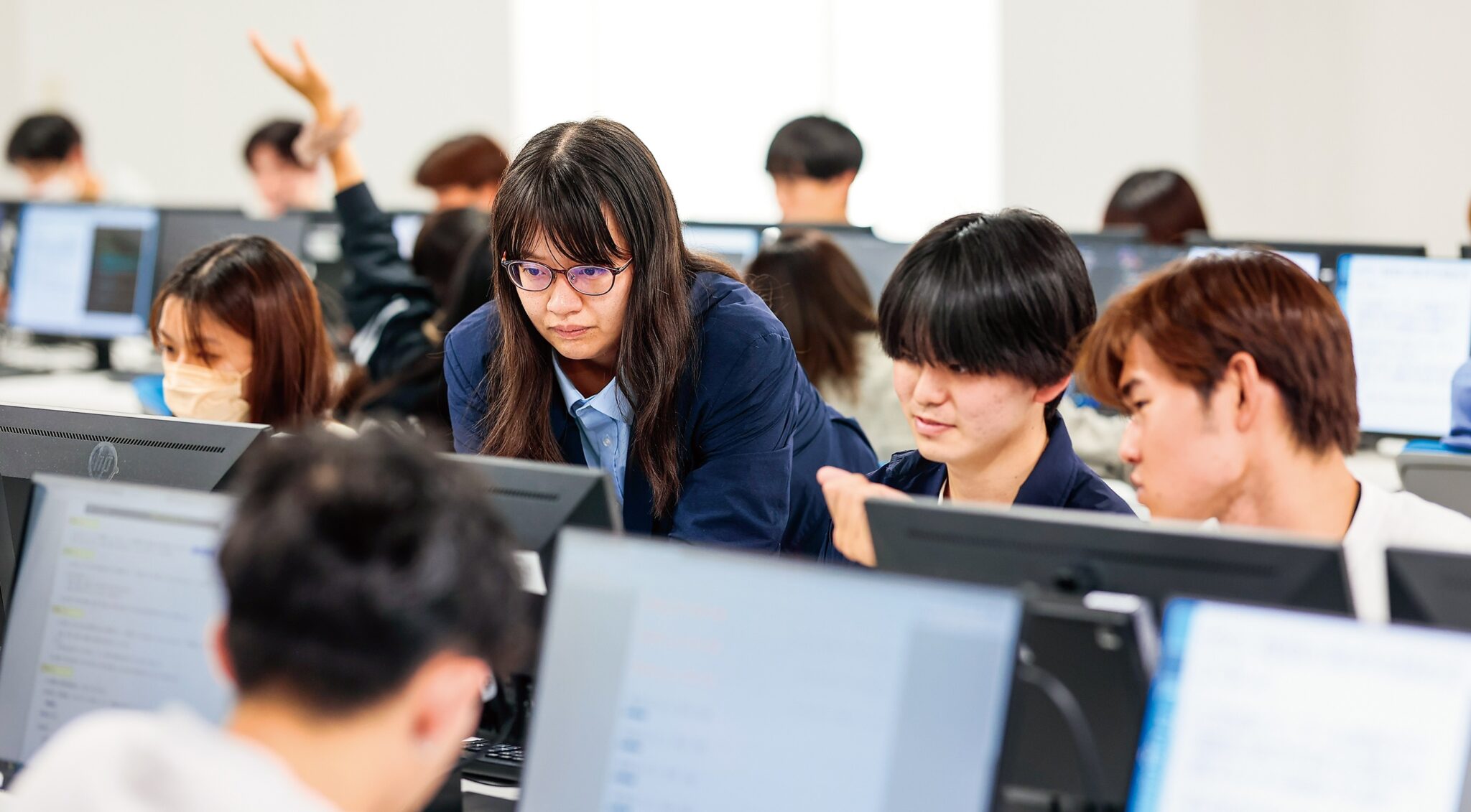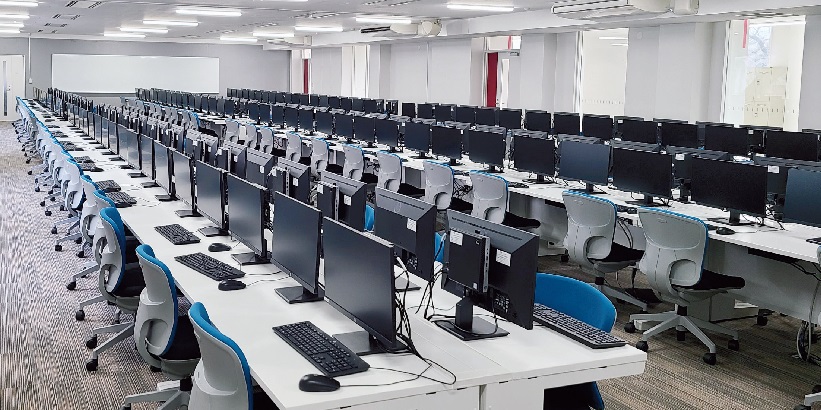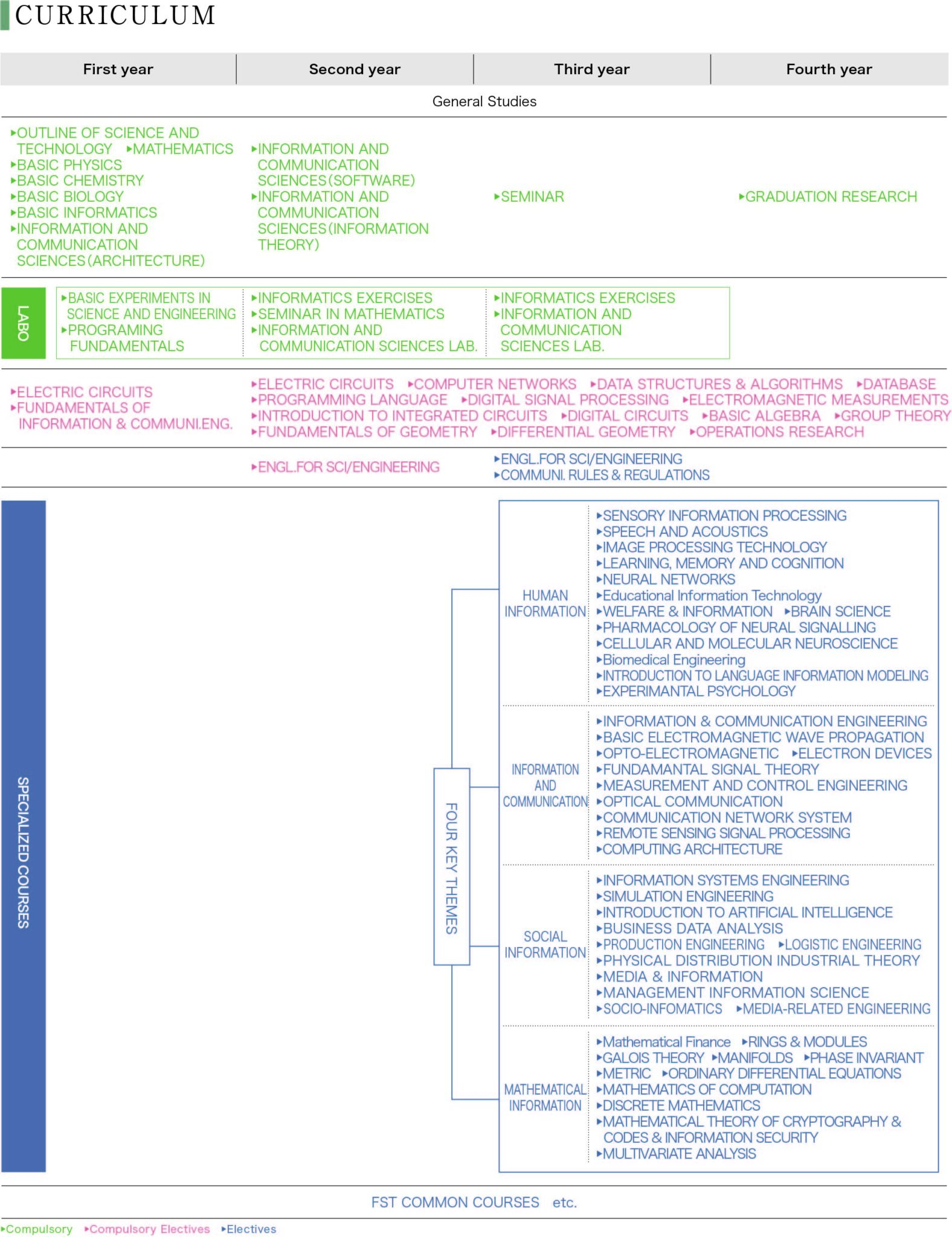Department of Information and Communication Sciences


Department Features
The Department of Information and Communication Sciences cultivates the ability to comprehend both people and society based on information, the creativity to develop the knowledge and experience accumulated by humans and society, and the ability to construct an information society where every human being can live safely. While providing learning the fundamentals of science and technology, students will focus on various specialties from key themes: Human Information, Communication Information, Social Information, and Mathematical Information. Based on “cross-disciplinary knowledge,” which is a fusion of science and engineering, we provide students with specialized education that equips them with the ability to open up the future while adapting to a wide range of fields. By acquiring cross-disciplinary knowledge, students can become not only people who can apply the latest information and communication technology and develop useful systems but also internationally active scientists and engineers as well as educators who can nurture the next generation.
Superior Combination of Science and Engineering

Besides programming exercises in a computer room available to everyone, students learn in a wide variety of fields such as mathematics, ergonomics, civil engineering, and communication engineering. What’s more, they are trained to transcend the boundaries of IT engineers to help create information technology.
Curriculum
Students will take basic major courses from the Faculty of Science and Technology Common Subject Group to achieve “fundamental education” related to all aspects of science and engineering such as mathematics, physics, chemistry, biology, and informatics. The aim is to obtain “cross-disciplinary and flexible education” as part of their specialized education. Another feature is the emphasis on acquiring an interdisciplinary viewpoint based on natural science in collaboration with the human and social sciences. In the third and fourth years, students will select a specialized field of their interest from among four key themes for Department Specialized Courses. And they can still take courses from outside their selected streams. All students also take courses such as programming exercises, laboratory experiments on electric circuits and logical circuits, and mathematical exercises. By linking with the knowledge acquired in regular courses and solving problems, students can obtain the skills needed for practical situations.
as of 2022
*For further information on the courses, please refer to the Syllabus.
Course Examples
- Fundamental Signal Theory
This course covers the theory underlying all information and communication systems such as the Internet and Mobile networks. Specifically, students will learn about information source coding and line coding, Fourier transformation and signal analysis, and noisy-channel coding theorem (Shannon limit).
- Business Data Analysis
This course introduces important techniques of machine learning used in business data analysis. Students will learn the theoretical mechanisms of machine learning, statistical programming software to analyze the results, and ways to apply the results of the analysis in actual business.
- Image Processing Technology
Students learn various image/video processing mechanisms related human and robot vision and their practical applications as well as actual programming exercises. The course also aims at acquiring intra-disciplinary knowledge based on the study of visual psychology and electronic sensors as well as the linkage with telecommunications and mathematics to learn the relationship between humans and information.
- Galois Theory
Galois theory, called the “flower of mathematics,” was born from the theory of solutions of equations. Students learn the basics of Galois theory, which is the foundation of various theories in modern mathematics and is also used in information mathematics through the theory of cryptography and codes.
- Speech & Acoustic Engineering
This course covers not only the information processing and physical aspects of sound and speech, but also acoustics in general. Topics range from the auditory and speech organs to theories of sound production, microphone and speaker mechanisms, music and musical instruments, hall and room acoustics, and ultrasonics.
- Information Systems Engineering
This course introduces students to the underlying technologies and concepts of the information system, including the types, forms, processing units, and components that should be considered when constructing an IT system. Students also gain further understanding of the functions of information systems, their evaluation, and forms of its development.
Available Teaching Licenses and Subjects
- First Category Teaching license for Junior High School (Mathematics)
- First Category Teaching license for High School (Mathematics, Information)
Available Qualifications
- Chief Electrical Engineer
- First-Class Technical Radio Operator for On-The-Ground-Services
- First-Class Radio Operator for General Services
- On-The-Ground I-Category Special Radio Operator
- Maritime III–Category Special Radio Operator
Curatorial Courses are also available.
Educational Objectives and Policies
-
To pursue the study of information science connected to human, communication, society and mathematics leveraging information theory, computer engineering, mathematics and biology as basic knowledge, and thereby cultivate a capacity for integrated and specialized analysis, synthesis and application of information employing interdisciplinary approaches.
-
To produce graduates capable of comprehending and accumulating information, knowledge and ideas developed by humans and society, and of advancing them through application to information technology contexts, in order to contribute to the creation of information structures, systems, and new information technologies that are useful to humans and society.
-
The Department of Information and Communication Sciences aims to foster human resources who can have an deep and integrated understanding of humans and society based on “information”, human resources who can accumulate the knowledge, wisdom and experience possessed by humans and society and compile visual information, and human resources with expertise in at least one of the following themes: human information, information communications, social information,
mathematical information, and who can organically combine such expertise to return to humans and society. With a view to these aims, the department sets standards for the skills and knowledge students should acquire before graduation as described below. Those who have fulfilled the requirements and have passed the thesis defense will be awarded a diploma.- The ability to understand “information” in the broad context of modern society in terms of its significance, principles and theory, and daily applications in various fields of society.
- The ability to respond to various aspects of humans based on an understanding of human-related information processing, including the brain and nerves, senses, cognition and language, as well as human activity-related information processing, including human support and educational support.
- The ability to take initiatives in solving the various issues associated with the advancement of information and communication technologies based on an understanding of the fundamental ICT.
- The ability to use and create cutting-edge information technologies based on an understanding of fundamental technologies associated with the generation, use, accumulation and distribution of information, such as IoT, artificial intelligence, databases, and software engineering.
- The ability to take initiative in solving the various issues associated with information technologies in modern society, acquired by gaining knowledge of mathematics, which is essential in understanding all modern sciences, including information sciences.
-
The Department of Information and Communication Sciences
aims to foster the ability to analyze, integrate and develop information comprehensively and in a specialized manner, based on information sciences, communication engineering, mathematic sand biology, integrated learning of the information related fields of humans, communications, society and mathematics, with the perspective of integrating arts and sciences. In accordance with the diploma policy, the Department constructs its curriculum with courses aligned with the following purposes.- To acquire the fundamental abilities to address the advancement of globalization through coursework in university-wide General Courses, Language Courses and courses for developing an understanding of Christian humanism. Also to acquire, mainly during the freshman and sophomore years, the basic academic skills to understand modern science through lectures, seminars and laboratory classes.
- To acquire cross-disciplinary and integrated knowledge by learning both scientific and engineering dimensions through courses ranging from those designed to develop understanding of humans, including human brains and neurological activity and sensory information, to those covering the measurement of human bodies and activity and application to welfare and education.
- In terms of software and hardware associated with information communications technologies, to acquire the fundamentals required of an information communications technician by learning expert technologies based on a comprehensive understanding of the entire system, in multiple basic courses that cover broad range of technological fields, from system components to their integration.
- To acquire the abilities required for fostering human resources who will use and create cutting-edge information technologies through courses ranging from basic engineering courses to applied courses incorporating social perspectives, in order to systematically understand various technologies associated with the generation, use, accumulation and circulation of social information contents.
- For all students, to acquire minimal mathematical knowledge through basic mathematics courses in order to understand fundamental theories in all information-related disciplines. Also, for students seeking to pursue research in mathematics in the graduate program, to acquire specialized knowledge of modern mathematics by taking a specialized course on the subject.
-
The Department of Information and Communication Sciences seeks human resources with a strong educational background, comprising an appreciation of culture and extensive knowledge as well as expertise regarding information that is utilized in various fields, who are able to integrate, apply and further develop such knowledge and expertise. We seek human resources who are eager to take a unique approach in establishing future society against the backdrop of science and technology and supporting fundamental studies as well as “multiple intelligence” constructed by integrating pieces of knowledge associated with humans and society:
- Those who have acquired solid basic academic skills that will serve as a foundation for studying information science, communications engineering, mathematics and biology.
- Those who have the logical thinking skills, broad perspectives, and good communication skills required to identify and solve academic issues.
- Those who show enthusiasm in studying multiple information-related fields, namely “human information”, “communication information”, “social information”, and “mathematical information”, and thus contribute to the elucidation of principles that help the understanding of phenomena, the establishment of nnew systems, and technology development.
Faculty Members
Masakatsu OGAWA Professor
Masao TSUZUKI Professor
Kanako OSHIRO Associate Professor
Ryo KAWABATA Associate Professor
Yasushi GOMI Associate Professor
Chikayoshi SUMI Associate Professor
Yuichiro MIYAMOTO Associate Professor
Takao YAMANAKA Associate Professor
Yusuke KAMEDA Assistant Professor
Akitoshi KIMURA Assistant Professor
Satoshi GOTO Assistant Professor
Rina KOMATSU Assistant Professor by Special Appointment
Hitoshi HIRATA Assistant Professor
